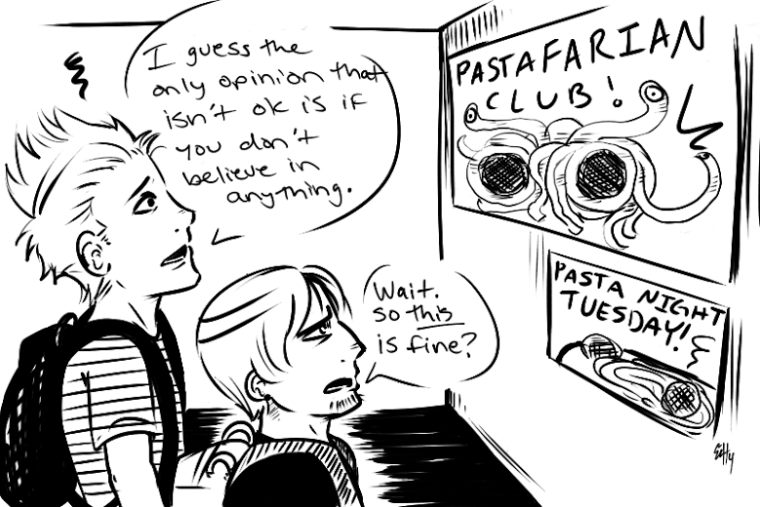The administration of Pisgah High School, a modestly sized public institution with about 1,000 students located in Canton, N.C., has been under fire for what it likely viewed was a minute omission of a fringe sect of students. The inevitable and well-due controversy that has followed must be a real eye-opener.
According to The Washington Post, when 17-year-old Ben Wilson asked his then-assistant principal Connie Weeks if he and other students could form their own chapter of the Secular Student Alliance, a national nonreligious organization with 379 chapters, he was eventually told that his group would not “fit in,” and there wouldn’t be a teacher available to sponsor such a group.
Briefly glancing over Pisgah High School’s website reveals that it has more than 30 clubs, including the overtly religious Fellowship of Christian Athletes, whose mission statement as shown on the schools web-page is to “… see our school and community impacted for Jesus Christ through the influence of athletes and coaches.” That being said, the administration clearly doesn’t have a problem with clubs that have an agenda, so long as that agenda aligns with their personal convictions.
Whether you are religious or not, it isn’t difficult to come to the conclusion that deliberately disavowing a group of students on the basis of their religious beliefs (or lack thereof) is immoral; and it would be a shame if anyone would misuse the doctrines of Christianity to justify such discrimination. As often as secular advocates argue that religion should not be in schools, few argue that religious organizations such as Young Life or the FCA should not be allowed to exist.
But the decision to not allow such a group to form is not only immoral, it’s illegal. The Equal Access Act, ironically signed into law by former President Ronald Regan in order to allow religious groups into schools, states that any school that receives federal funding, such as Pisgah High, is prohibited from stopping student groups to form on a “religious, political, or philosophical” basis. It also states that school administrators are required to provide a sponsor for such a group from their faculty.
And I am not the only person who has noticed this: The ACLU, Freedom from Religion Foundation and the Secular Student Alliance have issued letters to both the principal of Pisgah and the superintendent of the Haywood County School System denouncing their actions as discriminatory and illegal.
A segment of the letter from the ACLU and FFRF reads, “Preventing Pisgah High students from forming an SSA group not only violates the law but is also bad policy. Nonreligious and non-Christian students within Pisgah High should have an equal opportunity to make their school a better place for themselves and their classmates.”
The end of SSA’s letter threatened, “If we do not her back from you within ten days, we will confer with the affected students on whether they wish to refer the matter to public interest litigators we work with.”
It is highly unlikely that, should the school continue its policy, the affected students won’t choose to go to court, considering they contacted the SSA and the FFRF about being discriminated against. It is even more unlikely that the school would win should the case go to court, as the law is obviously not on their side of the argument.
If the school administrators know what is best for themselves and their students, they will promptly discontinue their discriminatory policy and appoint a faculty representative for the SSA’s 46th high school chapter at Pisgah High. But then again, if they really knew what was best for their students, the ACLU would have never written them a letter, and I never would have written this column.
Send your thoughts to Tim at technician-viewpoint@ncsu.edu.











